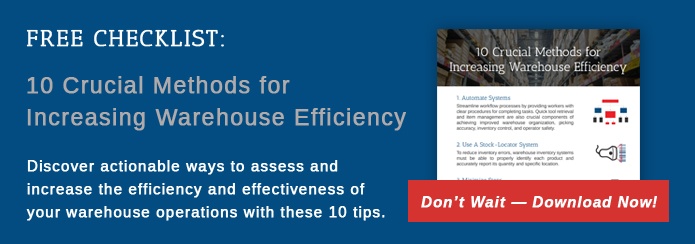 Warehouse management software (WMS) systems became fairly standard in most large storage and shipping facilities during the 1990s. Although these systems made operations and inventory management significantly more efficient and were an indisputable upgrade compared to tracking inventory via paper, pen, and a clipboard, many companies today still resist upgrading their WMS.
Warehouse management software (WMS) systems became fairly standard in most large storage and shipping facilities during the 1990s. Although these systems made operations and inventory management significantly more efficient and were an indisputable upgrade compared to tracking inventory via paper, pen, and a clipboard, many companies today still resist upgrading their WMS.
Considering the massive changes that have occurred in both industry and Warehouse Management Systems over the last 20+ years, you might ask, "Why would companies hold out on upgrading?"
- Expense
One of the most predominant fears of upgrading warehouse management software is cost. The surface perception is that the change will require a huge investment of money and time. But, consider, how much time and money is being lost every day due to an inefficient warehouse operation that is based on an antiquated, clunky WMS?
When weighing the cost of a WMS upgrade, take time to study your current operations. How efficient is it? How easy is the software to use? Can your current WMS easily keep up with an ever-changing inventory? You may find that the inefficiencies in your current system are costing you a lot more than you realized. - Commitment to Current Software
Many companies initially built their warehouse operation around a particular version of one vendor's software. By upgrading the software or opting for a different WMS, managers fear that it could mean updating the entire warehouse operation.
In other cases, a company has an ERP or MRP system that includes a warehouse management module, and even if the module is unable to keep up with current demands or has become a bad fit for the needs for the warehouse, the warehouse manager is determined to keep trying to use the system regardless.
When considering jumping ship from older software to an up-to-date WMS, consider what you like best about your current WMS or module and compare it against the long-term benefits and opportunities of a relationship with a new software company. Which is more in alignment with your warehouse goals? Is the newer WMS a better fit? Is brand loyalty worth missing out on the difference? - Unaware of Options / Not Knowing Better
Some companies who are doggedly applying outdated practices or are persistently "making it work" with their current WMS have simply never explored the available features offered by newer WMS packages. By taking the time to explore alternatives and consider the possibilities, they may discover the plethora of options that are now available... options that can make their warehouse management much simpler, more streamlined, and far more efficient. - If It's Not Broken, Don't Touch It
A prevailing theory in some companies is that if something is working, or even half working, don't touch it! Often, the fear is that an upgrade will actually make their process worse, thinking that the additional features and functions will slow down the system and cause it to work less effectively. Hence upgrades are perceived as unnecessary and potentially too disruptive to even contemplate. This kind of thinking, unfortunately, often ends up putting the company at a disadvantage with its competition by driving up costs and reducing efficiency. - Fear of Disrupting the Supply Chain
Companies rely on smooth warehouse and supply chain operations, so the thought of initiating upgrades that could disrupt such a vital system is enough to make some warehouse managers run from the very idea of a WMS upgrade.
However, with careful planning and testing, an upgrade to your WMS should cause minimal disruption in the supply chain. The investment of time and effort will pay off in the long run with a more responsive, more efficient warehouse operation.
By intentionally exploring the perceptions and realities related to updating your WMS, you may find that there are a number of hidden losses that come to light related to inefficiencies that have evolved over time. Addressing those may have an immediate impact on your profitability.



